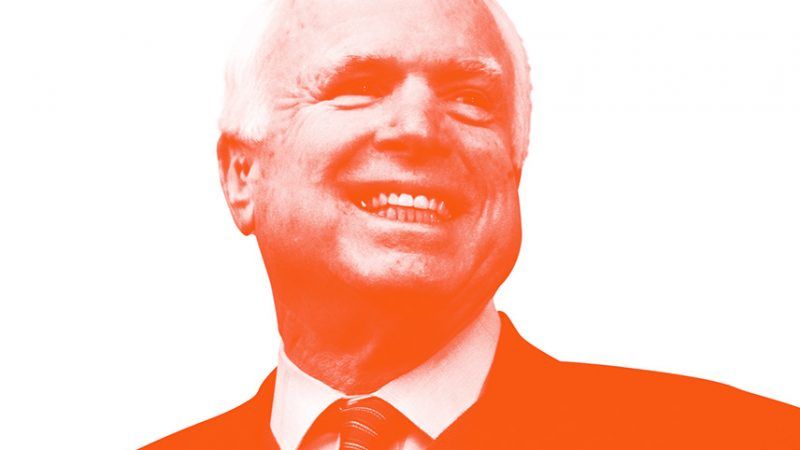John McCain: The Anti-Trump

For both good and ill, Sen. John McCain of Arizona is the closest the Republican Party has to the opposite of Donald Trump. He is the moral conscience that promises to check the president's excesses, and he is the hypocritical Washington lifer whose cynical rhetoric and interventionist passions helped create the Trumpian backlash in the first place.
McCain, who was diagnosed with brain cancer in July, famously spent five-plus years imprisoned in Vietnam; Trump meanwhile received five deferments exempting him from the conflict. Trump believes that torture "absolutely works," and on the campaign trail advocated violating Geneva Convention prohibitions and overruling his own military brass if need be. (He later backtracked on the latter threat.) McCain, an actual victim of torture, is the leading Republican opponent of the practice, arguing that it "doesn't work" as an intelligence-gathering tool.
Trump almost never apologizes for his inflammatory statements, including his notorious crack about McCain's heroism: "I like people that weren't captured, OK?" McCain's extravagant apologies are almost as well-known on Capitol Hill as the temper that makes them necessary. When he still had a fighter's chance against Barack Obama for the presidency, McCain publicly rejected attempts by the GOP base to portray the then-senator as an "Arab" or even a "socialist." Trump, on the other hand, refused to fully disavow the birther conspiracy theory until September 2016.
Trump is widely loathed by the press; he gleefully adds fuel to the fire by threatening lawsuits, railing against "fake news," and calling journalists "the enemy of the people." McCain, with the exception of when he was running against a Democrat for president, has been so cozy with the national media that for years he referred to them as his "base."
But neither the Fourth Estate nor its favorite anti-Trump conservatives have grappled with how their mutually reinforcing behavior helped drive voters into the populist's arms.
The political class exacts little or no penalty on politicians, commentators, and activists who back a government intervention, particularly in the foreign policy realm, that goes disastrously wrong. McCain not only championed the war in Iraq but called Obama's 2011 foray into Libya "both right and necessary." He is forever advocating further troop surges in Afghanistan, the arming of various rebels in Syria and elsewhere, sketchy new additions to the North Atlantic Treaty Organization, and economic sanctions against whichever country he's not quite ready to bomb. Not only are these recommendations frequently wrong, they are typically delivered in the highest moral dudgeon.
Trump has been an explicit critic of this promiscuous interventionism, saying such non-McCainite things about Afghanistan as "I want to find out why we've been there for 17 years."
McCain's political cynicism and insincerity, too, made Trumpism more attractive. In 2006 and 2013, the Arizona senator was the GOP point man on bipartisan efforts to craft comprehensive immigration reform. But whenever he was up for a tough election—against Obama in 2008, or against immigration hawk J.D. Hayworth for Senate in 2010—McCain pandered grossly to the base, rejecting bills he'd previously co-sponsored and vowing to "complete the danged fence."
Because members of the press like him, McCain's many missteps and hypocrisies are routinely portrayed as expedient deviations from what journalists are convinced is "the real McCain." (In the most succinct two-sentence version of the genre, New York magazine columnist Jonathan Chait wrote in 2006: "Go ahead, senator, flip-flop away. I know you're with us at heart.") It is from such gaseous behavior that the phrase "drain the swamp" draws potency.
In a high-profile Senate speech July 25, McCain rousingly declared that "we are not the president's subordinates," even while casting a deciding vote to prolong Obamacare replacement legislation Trump desperately wants passed. He acknowledged his own role in the coarsening of America's political conversation, even while barking "to hell with" the "bombastic loudmouths on the radio and television and the internet." He invoked honor and principle while reminding experienced observers how often he has strayed from both.
As the media begin cranking out what might be their final round of encomia for the man, let us not overlook how he—and they—helped give rise to the president they both so despise.
This article originally appeared in print under the headline "John McCain: The Anti-Trump."


Show Comments (100)